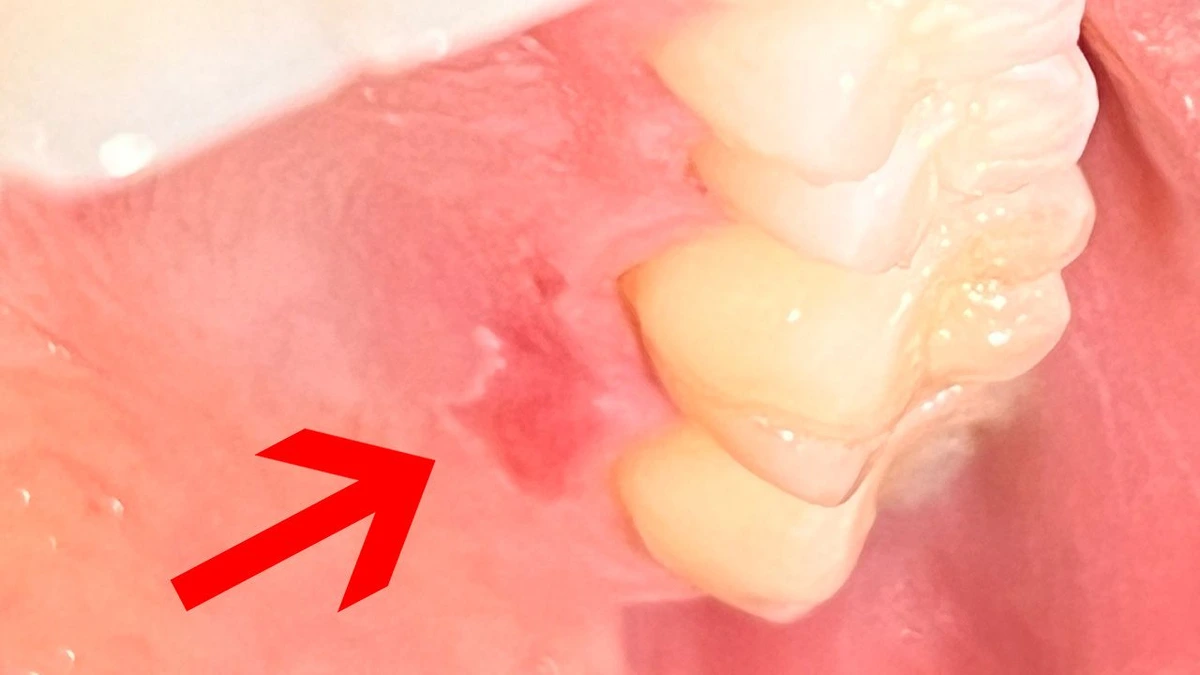The skin in your mouth may be peeling due to thermal burns caused by consuming hot foods or fluids, or it could be a result of chemicals found in drugs and drinks. These chemicals can cause peeling.
Additionally, habits like cheek biting and acidic substances in the foods we eat can contribute to the peeling of oral mucosa. It may also be a side effect of dental complications such as oral thrush. To stop the skin from peeling inside your mouth, it's recommended to avoid hot foods and drinks, practice good oral hygiene, and minimize habits that can irritate the oral mucosa.
Seeking dental advice is advisable if the peeling persists or is accompanied by other symptoms.

Credit: www.teethtalkgirl.com
Causes Of Mouth Skin Peeling
There are several factors that can lead to skin peeling inside your mouth. Understanding these causes can help you identify the underlying issue and determine the best course of action for treatment. Let's dive into the potential reasons behind mouth skin peeling:
Hot Food Or Fluids
Consuming hot food or fluids can be a common cause of mouth skin peeling. When you consume something hot, it can cause thermal burns, resulting in the peeling of the mucosa lining your mouth. With repeated exposure to heat, these burns can progress into painful ulcers. It's important to let your food or fluids cool down to prevent potential damage to the delicate skin in your mouth.
Chemicals In Drugs And Drinks
Chemicals present in certain drugs and drinks can also contribute to mouth skin peeling. These chemicals, such as acids or enzymes, can irritate and damage the mucosa, leading to peeling. It's essential to be mindful of the substances you consume and their potential effects on the health of your mouth.
Allergic Reaction To Mouthwash
In some cases, peeling inside the mouth can occur as a result of an allergic reaction or sensitivity to certain ingredients in mouthwash. Mouthwashes often contain alcohol and other components that can lead to irritation, particularly in individuals with sensitive skin. If you notice skin peeling after using a particular mouthwash, consider switching to a milder alternative.
Habits And Dental Complications
Various habits and dental complications can contribute to mouth skin peeling. For instance, biting or chewing on your lips, cheeks, or tongue can cause the skin to peel and become irritated. Similarly, dental issues like braces or dentures that don't fit properly can lead to friction and subsequent peeling of the skin. Ensuring proper oral hygiene and addressing any underlying dental problems is essential in preventing mouth skin peeling.
Understanding the causes of mouth skin peeling can help you determine the appropriate steps for prevention and treatment. If you are experiencing persistent or severe peeling, it is recommended to consult a dentist or healthcare professional for a thorough evaluation and guidance.
Credit: www.reddit.com
Understanding Oral Epitheliolytic
Understanding Oral Epithelializes: Discover why the skin inside your mouth may be peeling due to factors such as thermal burns from hot foods, chemicals in drugs and drinks, or complications like oral thrush. The oral mucosa can also peel due to habits like cheek biting or the consumption of acidic substances.
What Is Oral Epitheliolytic?
Oral epitheliolytic, also known as shedding oral mucosa or oral mucosal peeling, is a condition characterized by the superficial desquamation of the oral mucosa. It is often unrecognized and underdiagnosed, but it can cause discomfort and concern for those experiencing it.
The oral mucosa is the mucous membrane lining the inside of the mouth, comprising stratified squamous epithelium called "oral epithelium" and an underlying connective tissue known as lamina propria. It plays a crucial role in maintaining oral health and reflects the overall well-being of an individual.
Causes Of Oral Epitheliolytic
There are several factors that may contribute to the occurrence of oral epitheliolytic:
- Chemicals: Certain chemicals present in drugs, drinks, and oral hygiene products, such as sodium lauryl sulphate (SLS), can lead to the peeling of the oral mucosa. These chemicals may irritate the delicate tissues inside the mouth, causing them to shed.
- Thermal Burns: Consuming hot food or fluids can result in the peeling of the oral mucosa. Repeated exposure to high temperatures can lead to thermal burns, which may subsequently develop into ulcers.
- Allergic reactions: Some individuals may experience an allergic reaction or sensitivity to certain ingredients found in mouthwashes or oral care products, such as alcohol or other chemicals. This can cause irritation and subsequent peeling of the oral mucosa.
It's important to note that oral epitheliolytic can occur as an isolated condition or as a result of a combination of these causative factors. If you are experiencing persistent peeling of the skin inside your mouth, it is recommended to seek advice from a dental professional for an accurate diagnosis and appropriate treatment.
Prevention And Treatment
When it comes to preventing and treating peeling skin in the mouth, there are a few strategies you can employ. By implementing these methods, you can alleviate discomfort and promote healing.
Avoiding Hot Foods And Drinks
Hot foods and drinks can be a common culprit for peeling skin in the mouth. The thermal burns caused by repeated intake of hot substances can lead to ulcers and peeling. To prevent this, it's important to be mindful of the temperature of the foods and drinks you consume.
If you notice that certain foods or drinks tend to aggravate your condition, try to avoid them or let them cool down before consuming. opt for lukewarm or room temperature items instead to reduce the risk of further irritation.
Managing Chemical Exposure
Chemicals found in certain drugs and drinks can also contribute to peeling skin in the mouth. These chemicals can cause irritation and damage to the delicate mucosa. To minimize the risk, it's important to be aware of the substances you are exposing your mouth to.
When choosing medications, opt for formulations that are gentle on the mouth. If you suspect that a certain drug or drink is causing peeling, consult with your healthcare provider or dentist for alternative options.
Choosing Gentle Mouthwashes
Mouthwashes can be beneficial for oral hygiene, but some formulations may contain harsh ingredients that can irritate the mouth and lead to peeling. To prevent this, choose mouthwashes that are specifically designed for sensitive mouths.
Look for gentle mouthwash options that are alcohol-free and have soothing ingredients such as aloe Vera or chamomile. These can help to maintain oral hygiene without causing further irritation.
Improving Oral Hygiene
Proper oral hygiene is crucial for keeping the mouth healthy and minimizing the risk of peeling skin. Regular brushing and flossing can remove debris and bacteria that can contribute to irritation and peeling.
Be gentle when brushing to avoid further damage to the delicate oral tissues. Consider using a soft-bristled toothbrush and a toothpaste that is specifically formulated for sensitive mouths.
In addition to brushing and flossing, consider incorporating mouth rinses or rinsing with warm saltwater to alleviate discomfort and promote healing.
In conclusion, by following these preventive measures and adopting a gentle oral care routine, you can reduce the chances of experiencing peeling skin in your mouth. If the condition persists or worsens, it's important to seek advice from a healthcare professional for further evaluation and treatment.

Credit: www.reddit.com
When To Seek Medical Help
If the skin in your mouth is peeling, it could be due to thermal burns from consuming hot foods or chemicals found in drugs and drinks. This peeling may also be caused by habits like cheek biting or as a side effect of dental conditions such as oral thrush.
Seek medical help if the peeling persists or is accompanied by other symptoms.
Persistent Or Severe Peeling
If you notice that the skin in your mouth is consistently peeling or if the peeling becomes severe, it may be a sign of an underlying issue that requires medical attention. While occasional peeling can be normal and may occur due to irritants or minor injuries, persistent or severe peeling could indicate a more serious problem.
Possible causes for persistent or severe peeling include oral thrush, a fungal infection that can lead to the formation of a white film in the mouth. This condition is characterized by an overgrowth of the candida fungus and can often be accompanied by symptoms such as a burning sensation or pain in the mouth. Another potential cause could be an allergic reaction or sensitivity to certain ingredients in oral care products, such as mouthwash containing alcohol or chemicals like sodium lauryl sulfate (SLS).
These ingredients can sometimes irritate the mouth, leading to peeling and discomfort. In some cases, persistent or severe peeling may be a symptom of a more serious condition, such as oral epitheliolytic. This rare condition causes superficial desquamation of the oral mucosa and can be triggered by certain oral hygiene products or occur spontaneously.
Accompanying Pain Or Discomfort
If the peeling of the skin in your mouth is accompanied by pain or discomfort, it is important to seek medical help. Painful peeling could indicate an underlying infection, injury, or inflammatory condition in the mouth. One possible cause of pain or discomfort is thermal burns.
When you consume hot foods or fluids, the mucosa in your mouth can peel off, which may initially cause a burning sensation. With repeated exposure to hot substances, these burns may progress to develop into ulcers, increasing the level of discomfort experienced.
Additionally, chemical exposure to certain drugs or drinks can also lead to peeling and pain. Chemicals present in these substances can irritate the delicate tissues in your mouth, causing the skin to peel and resulting in discomfort.
If you experience persistent or severe peeling in your mouth, especially when accompanied by pain or discomfort, it is essential to seek medical help. A healthcare professional will be able to assess your specific situation, provide an accurate diagnosis, and recommend an appropriate treatment plan to alleviate your symptoms and promote healing.
Frequently Asked Questions Of Why Is The Skin In My Mouth Peeling
Why Is Skin Peeling Off Inside My Mouth?
Skin peeling inside your mouth can occur due to thermal burns from consuming hot food or fluids, as well as from chemicals in drugs and drinks. It can also be a result of dental complications like oral thrush or habits like cheek biting.
To stop the peeling, you can try avoiding hot foods, treating any underlying conditions, and practicing good oral hygiene.
What Is The White Film In My Mouth Peeling?
The white film in your mouth peeling is a condition called oral thrush. It's caused by an overgrowth of the candida fungus, which is a natural yeast in your body. Factors like weakened immune system or medications can lead to this overgrowth.
Why Does The Inside Of My Mouth Peel After I Use Listerine?
The skin inside your mouth may peel after using Listerine due to an allergic reaction or sensitivity to some of the mouthwash's ingredients. Listerine contains alcohol and other chemicals that can irritate sensitive individuals.
Conclusion
The peeling of skin in the mouth can be caused by various factors, such as the ingestion of hot foods and fluids, chemical irritants, or dental complications like oral thrush. It is important to be mindful of our oral habits, such as cheek biting, and to avoid acidic substances that can contribute to skin peeling.
If you experience persistent or severe peeling, it is recommended to consult with a dental professional for proper diagnosis and treatment.






0 Comments